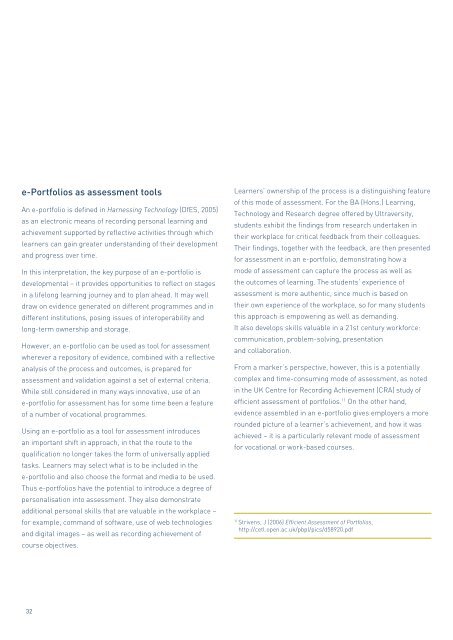Effective Practice with e-Assessment: An overview of ... - Jisc
Effective Practice with e-Assessment: An overview of ... - Jisc
Effective Practice with e-Assessment: An overview of ... - Jisc
You also want an ePaper? Increase the reach of your titles
YUMPU automatically turns print PDFs into web optimized ePapers that Google loves.
e-Portfolios as assessment tools<br />
<strong>An</strong> e-portfolio is defined in Harnessing Technology (DfES, 2005)<br />
as an electronic means <strong>of</strong> recording personal learning and<br />
achievement supported by reflective activities through which<br />
learners can gain greater understanding <strong>of</strong> their development<br />
and progress over time.<br />
In this interpretation, the key purpose <strong>of</strong> an e-portfolio is<br />
developmental – it provides opportunities to reflect on stages<br />
in a lifelong learning journey and to plan ahead. It may well<br />
draw on evidence generated on different programmes and in<br />
different institutions, posing issues <strong>of</strong> interoperability and<br />
long-term ownership and storage.<br />
However, an e-portfolio can be used as tool for assessment<br />
wherever a repository <strong>of</strong> evidence, combined <strong>with</strong> a reflective<br />
analysis <strong>of</strong> the process and outcomes, is prepared for<br />
assessment and validation against a set <strong>of</strong> external criteria.<br />
While still considered in many ways innovative, use <strong>of</strong> an<br />
e-portfolio for assessment has for some time been a feature<br />
<strong>of</strong> a number <strong>of</strong> vocational programmes.<br />
Using an e-portfolio as a tool for assessment introduces<br />
an important shift in approach, in that the route to the<br />
qualification no longer takes the form <strong>of</strong> universally applied<br />
tasks. Learners may select what is to be included in the<br />
e-portfolio and also choose the format and media to be used.<br />
Thus e-portfolios have the potential to introduce a degree <strong>of</strong><br />
personalisation into assessment. They also demonstrate<br />
additional personal skills that are valuable in the workplace –<br />
for example, command <strong>of</strong> s<strong>of</strong>tware, use <strong>of</strong> web technologies<br />
and digital images – as well as recording achievement <strong>of</strong><br />
course objectives.<br />
Learners’ ownership <strong>of</strong> the process is a distinguishing feature<br />
<strong>of</strong> this mode <strong>of</strong> assessment. For the BA (Hons.) Learning,<br />
Technology and Research degree <strong>of</strong>fered by Ultraversity,<br />
students exhibit the findings from research undertaken in<br />
their workplace for critical feedback from their colleagues.<br />
Their findings, together <strong>with</strong> the feedback, are then presented<br />
for assessment in an e-portfolio, demonstrating how a<br />
mode <strong>of</strong> assessment can capture the process as well as<br />
the outcomes <strong>of</strong> learning. The students’ experience <strong>of</strong><br />
assessment is more authentic, since much is based on<br />
their own experience <strong>of</strong> the workplace, so for many students<br />
this approach is empowering as well as demanding.<br />
It also develops skills valuable in a 21st century workforce:<br />
communication, problem-solving, presentation<br />
and collaboration.<br />
From a marker’s perspective, however, this is a potentially<br />
complex and time-consuming mode <strong>of</strong> assessment, as noted<br />
in the UK Centre for Recording Achievement (CRA) study <strong>of</strong><br />
efficient assessment <strong>of</strong> portfolios. 11 On the other hand,<br />
evidence assembled in an e-portfolio gives employers a more<br />
rounded picture <strong>of</strong> a learner’s achievement, and how it was<br />
achieved – it is a particularly relevant mode <strong>of</strong> assessment<br />
for vocational or work-based courses.<br />
11<br />
Strivens, J (2006) Efficient <strong>Assessment</strong> <strong>of</strong> Portfolios,<br />
http://cetl.open.ac.uk/pbpl/pics/d58920.pdf<br />
32
















